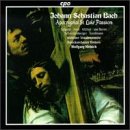| All Artists: Johann Sebastian Bach, Wolfgang Helbich, Bremen Baroque Orchestra, Mona Spagele, Harry van Berne, Rufus Muller Title: Bach: Apocryphal St. Luke Passion BWV.246, Anh.II,30 Members Wishing: 0 Total Copies: 0 Label: Cpo Records Release Date: 4/22/1997 Genre: Classical Styles: Opera & Classical Vocal, Historical Periods, Baroque (c.1600-1750), Sacred & Religious Number of Discs: 2 SwapaCD Credits: 2 UPC: 761203929320 |
Search - Johann Sebastian Bach, Wolfgang Helbich, Bremen Baroque Orchestra :: Bach: Apocryphal St. Luke Passion BWV.246, Anh.II,30
 | Johann Sebastian Bach, Wolfgang Helbich, Bremen Baroque Orchestra Bach: Apocryphal St. Luke Passion BWV.246, Anh.II,30 Genre: Classical
|
Larger Image |
CD Details |
CD ReviewsGood Passion -- Probably not by Bach Paul C. Stratman | Winona MN USA | 03/14/2001 (4 out of 5 stars) "This performance of the "Apocryphal" St. Luke Passion is performed in a light and fresh manner. It is thouroughly enjoyable. The work is most likely not by Bach. If it is, he wrote it when he was very young. (Handwriting analysis suggests the manuscript was copied by Bach and his son, later in his life.) The composer's taste is not as mature as Bach's in his genuine St. John and St. Matthew Passions. (The opening chorus, "Fear and trembling . . ." is way too upbeat and happy.) The recitatives sound very much like Bach. The chorales are similar to Bach, but the melodies are slightly different from those used by Bach in his Passions. I would reccomend this recording to those who like Bach's Passions, and who are curious about works that have been attributed to him. Great performance, great recording!" Du Gibst Mir Blut R. Gerard | Pennsylvania USA | 04/19/2002 (5 out of 5 stars) "Only two numbers in this Lukasspassion were written by Bach. The Chorale/Aria "Aus Der Tiefe" was written by Bach and appears in another cantata whose BWV I do not remember. The first recit in Part two was also written by Bach. It is unknown how many numbers can be attributed to his son Carl Phillip who helped his father copy this piece.This is nonetheless a very good recording. The sound is clear and the choir and orchestra are fully awake (not like many historically-informed ensembles).While it is less imaginative than other Passions you might be familiar with (St. Matthew or St. John perhaps) this is still worth adding to your collection.This passion is full of chorales, and arias are sparse. But the first aria, "Du Gibst Mir Blut" is a real attention grabber, a little bit like a small-scale "Ebarme Dich".Since it is clearly by another man (on stylistic grounds) and it was copied in Bach's handwriting with a couple of numbers of his own to add, my guess is that Bach and his son may have reorchestrated this work, changed a few things around, and did other editions to this Lukaspassion by another composer... just like what Mozart did to Haendel's Messiah or what Mendelsohn did to Bach's St. Matthew Passion.This is not typical Bach music, but it is highly recommended and will trigger your imagination." Surprisingly light and yet suffering is everpresent Jacques COULARDEAU | OLLIERGUES France | 03/31/2004 (4 out of 5 stars) "It is said to be apocryphal and I am not entirely sure it really is. It keeps the originalities of Saint Luke's gospel. It keeps the general structure of Bach's passions, but it pushes it into an extreme coloration. In fact it is very close to Saint Mark's passion in its structure, very didactic though even more. But Saint Mark's Passion and Saint's Luke Passion stand apart from the others by this didactism, this heavy presence of chorals, reduced presence of arias and even of choruses. It is another style in a way, for a congregation that cannot have a rich chorus and numerous singers. It is for a congregation that considers a passion is not a show but a rite and they have to take part. Mark and Luke hence stand apart from John and Matthew that require a heavy presence of professional musicians and singers, especially Matthew that has two choruses in the score. But the rendition of this Saint Luke's Passion by the Bremen musicians and singers insist on the baroque side of Bach's music which makes it different from other interpretations that respect a less baroque tradition, which is traditionally accepted for Bach. In other words the music and the singing of this passion by these artists sound at times French or even Italian, clear and light in many ways. The crowds, or the soldiers, or the high priests are rejoicing in the suffering described in front of them. They are not cynical in their tone, just enjoying the circus games they get free on the day before the celebration of Passover. It is a tone we are not used to with Bach. It is surprising and yet, why should Bach be different from the other musicians of his time, or even from other non religious pieces of his ? I find this interpretation interesting and maybe inspiring. Dr Jacques COULARDEAU"
|

 Track Listings (49) - Disc #1
Track Listings (49) - Disc #1